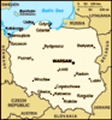Advertisement
Published: October 22nd 2017
Long before Lech Walesa and Madame Curie, the only Polish person I had ever heard of was Frederic Chopin. Born near Warsaw in 1810, he died in Paris in 1849, at a very early age. But fortunately for us, his great music and composition lives on. He was perhaps, best known as both a pianist, and his solo pieces for piano and piano concerti. In fact, he wrote little else.
His father was an immigrant from France and was employed as a tutor to wealthy families in Poland. His father became a French teacher at the Warsaw lyceum. Chopin himself attended from 1823 to 1826. He became fascinated by his mother and his older sister playing the piano. By the age of six, he was trying to emulate their sound, and at seven, started piano lessons. He quickly surpassed his instructor, Zwyny, and discovered his own approach to the piano, free of academic rules and discipline.
Soon, he was playing at private events, and by the age of eight, played in a charity event. A mere three years later, he played for Russian tsar Nicholas I, who was in Warsaw to open Parliament. At seven,
he wrote his first piece,
treatises by musicologists to strengthen his
counterpoint. His harmonic vocabulary at this period also grew much more daring, though never at the cost of sensuous beauty. He valued that quality throughout life as much as he
abhorred descriptive titles or any hint of an underlying “program.”
By 1848, his relationship with Sand ended, and his health likewise further eroded. After a strenuous tour through England, where he was unable to socialize or compose, he returned to Paris, where he died in 1849. He was buried in a Paris cemetery, but his heart was interred in Warsaw.
During his lifetime, he gave few more than 30 public performances. His lasting legacy to music: "His original and sensitive approach to the keyboard allowed him to exploit all the resources of the piano of his day. He was inexhaustible in discovering colorful new passage work and technical figures; he understood as no one before him the true nature of the piano as an expressive instrument, and he was able to write music that is bound up with the instrument for which it was conceived and which cannot be imagined apart from it.
His
innovations in fingering, his use of the pedals, and his general treatment of the keyboard
form a milestone in the history of the piano, and his works set a standard for the instrument that is recognized as unsurpassable."
His works:
Chopin’s works for solo piano include about 61 mazurkas, 16 polonaises, 26 preludes, 27 études, 21 nocturnes, 20 waltzes, 3 sonatas, 4 ballades, 4
scherzos, 4
impromptus, and many individual pieces—such as the
Barcarolle, Opus 60 (1846); the
Fantasia, Opus 49 (1841); and the
Berceuse, Opus 57 (1845)—as well as 17 Polish songs. His style: He had the rare gift of a very personal melody, expressive of heartfelt emotion, and his music is penetrated by a poetic feeling that has an almost universal appeal. Although “romantic” in its essence, Chopin’s music has a classic purity and discretion, without a sign of exhibitionism. He found within himself and in the tragic story of Poland the chief sources of his inspiration. The theme of Poland’s glories and sufferings was constantly before him, and he transmuted the primitive rhythms and melodies of his youth into enduring art forms. At the same time, he subtly
differentiated, for example, the
intimate poetic inspiration of the
mazurka from the more outward-looking, ceremonial aspect of the
polonaise, which in works like the
Polonaise-Fantaisie (1846) he expanded to the proportions of symphonic poems for the piano. The
waltz, meanwhile, offered him a courtly
dance medium on a smaller scale, and he responded not by expanding it but by bringing it to unprecedented levels of polish and grace. From the great Italian singers of the age, he learned the art of “singing” on the piano, and his nocturnes reveal the perfection of his cantabile style and delicate charm of ornamentation. His ballades and scherzos, on the other hand, have a dramatic turbulence and passion that effectively dispel the notion that Chopin was merely a drawing-room composer.
• Listen: Chopin, Frédéric:
Ballade No. 3 in A-flat MajorFrédéric Chopin’s
Ballade No. 3 in A-flat Major, Opus …
Chopin’s small output was mostly confined to solo piano; yet within its limited framework its range is seen to be vast, comprehending every variety of
musical expression. Though Chopin squandered too much time on the drawing-room Parisian
aristocracy and disappointed critics who valued artistic worth only in terms of large-scale achievement, he was immediately recognized at his true worth by more-discerning contemporaries, who were astounded by the startling originality he
reconciled with
exquisite craftsmanship. Present-day evaluation places him among the immortals of music by reason of his insight into the secret places of the heart and because of his awareness of the magical new sonorities to be drawn from the piano.
Arthur HedleyLeon PlantingaThe Editors of Encyclopedia Britannica The quotes are from Britannica, I am hardly a music expert, but I do like Chopin. I will find a concert, even if it is on you tube!!
Advertisement
Tot: 0.122s; Tpl: 0.009s; cc: 10; qc: 22; dbt: 0.0783s; 1; m:domysql w:travelblog (10.17.0.13); sld: 1;
; mem: 1.1mb







